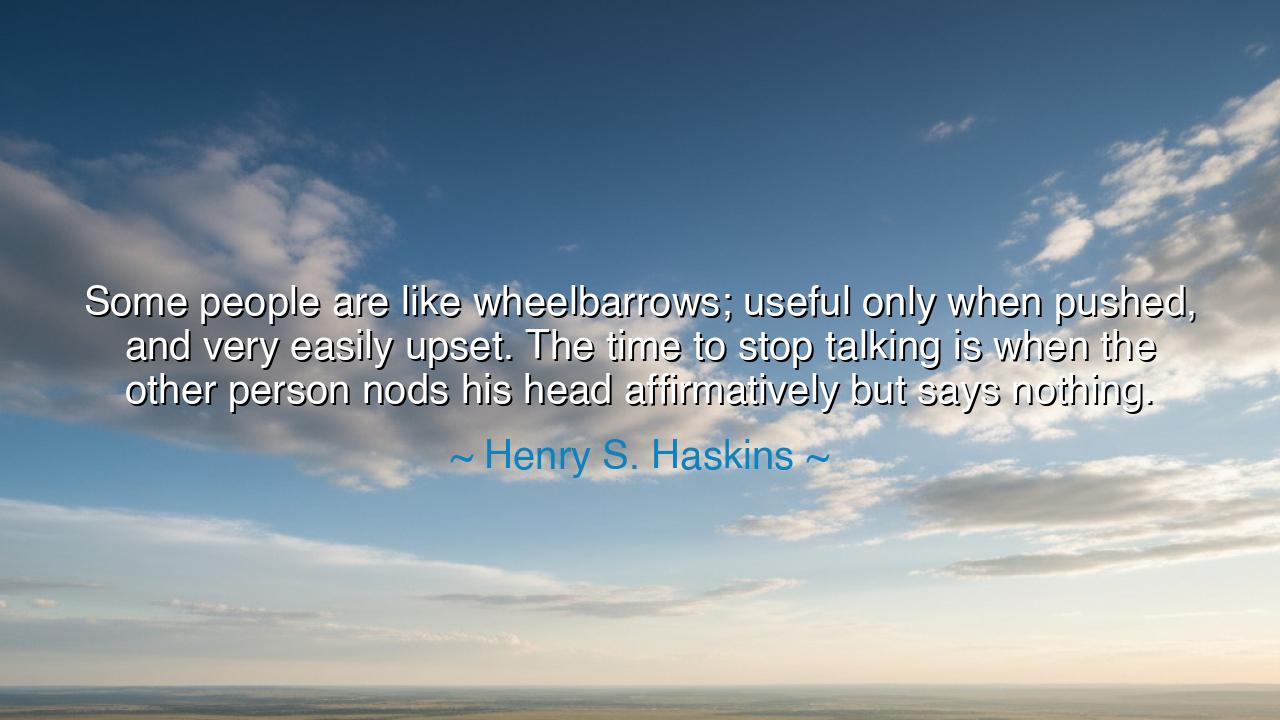
Some people are like wheelbarrows; useful only when pushed, and
Some people are like wheelbarrows; useful only when pushed, and very easily upset. The time to stop talking is when the other person nods his head affirmatively but says nothing.






Henry S. Haskins, the keen observer of human nature, once wrote words sharp as a blade yet veiled in humor: “Some people are like wheelbarrows; useful only when pushed, and very easily upset. The time to stop talking is when the other person nods his head affirmatively but says nothing.” Though witty on the surface, these sayings strike deep into the heart of wisdom. They reveal both the fragility of human character and the subtle art of communication, truths as old as the ancients themselves.
The first image, of men compared to wheelbarrows, carries a powerful lesson. Haskins reminds us that some souls do not move by their own strength, but only when driven by others. Their usefulness depends not on their own initiative, but on the will of those who push them forward. And, like wheelbarrows, they are easily upset—they tip over at the slightest imbalance. Such people may serve a purpose for a time, but they lack the inner stability that marks true greatness. It is a warning: do not be content to live as a wheelbarrow, moved only by another’s hand.
The second counsel concerns the art of speech: “The time to stop talking is when the other person nods his head affirmatively but says nothing.” This is a reminder that words, though precious, can also become excessive. When your listener no longer responds, when he nods but remains silent, your words are no longer entering his heart—they have become noise. The wise man knows when to stop, when silence speaks louder than speech. For persuasion is not in flooding the ears, but in planting seeds that may grow in quiet soil.
History provides vivid examples of these truths. Consider the tale of Cato the Younger, the Roman statesman famed for his stoicism. Unlike the wheelbarrow-men of his day, Cato was unmoved by bribery or pressure; he acted by principle, not by another’s push. In contrast, many senators of Rome swayed like reeds, useful only when driven by ambition or fear, and easily upset when challenged. Their weakness allowed tyranny to rise, while Cato’s steadfastness, though tragic, became a beacon of honor. Haskins’ wheelbarrow reminds us of such men, hollow in strength, waiting to be moved by others.
As for the wisdom of speech, we recall Confucius, who taught that the superior man is sparing of words, and that silence often carries greater dignity than endless speech. Or think of Abraham Lincoln, who was famed for his ability to stop speaking at just the right moment, letting his words linger in silence, giving them weight. Many who talk endlessly dilute their wisdom; the few who know when to be silent are remembered. Haskins’ counsel to cease when the nod comes is the same: let your words rest before they sour.
The lesson is twofold: first, be a person who moves by your own strength, not one who waits to be pushed by others. Cultivate initiative, resilience, and balance, so you are not easily upset by small trials. Second, master the art of measured speech. Speak with clarity, and when you sense your listener has understood—even if he answers only with silence—cease. In this way your words retain power, and your presence retains dignity.
Practical wisdom flows from this teaching. Each day, ask yourself: am I moving by my own will, or only by the pressure of others? Am I steady, or easily overturned by small troubles? And in your speech, practice restraint. When the eyes of your listener glaze or nod without reply, let silence take your place. In silence, words find their echo.
Thus Haskins’ playful metaphors are not trifles, but truths: wheelbarrows and silence—images that reveal the core of human strength and communication. Remember them, and you will not live as one easily tipped, nor speak as one easily ignored. Instead, you will walk with stability, and speak with wisdom, as the ancients counseled those who sought to live well and endure.






AAdministratorAdministrator
Welcome, honored guests. Please leave a comment, we will respond soon